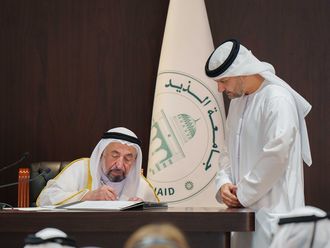The highest function of education is to bring about an integrated individual who is capable of dealing with life as a whole.” -J. Krishnamurti
According to the 6th edition of Oxford Advanced Learner’s Dictionary, the word “education” is a process of teaching, training and learning, especially in schools or colleges, to improve knowledge and develop skills.
One of the greatest challenges facing schools today is the need of developing highly educated and versatile students. We at GEMS Westminster School – Ras Al Khaimah, and all GEMS schools more broadly, recognize that need more than anyone else.
Parents, in increasing numbers, are seeking alternatives to basic academically focused education. They realize that just focusing on academics is not enough, and they have seen young people in their communities that are not well rounded individuals. Parents now see that there is a need for their children to learn those “other things”, like music, art, sports etc.
Why does education need to be multifaceted?
Today’s world has an ever increasing market for jobs that didn’t exist a few years ago, and many of them don’t necessarily hover around academics. This is why there is a need to offer our young adults a variety and range of exciting experiences and diverse opportunities.
Murphy (1998) suggests that the educational industry is challenged because businesses and organizations are shifting from an industrial world to a communication, service world, and the economic, political, and social domains impact education. The changes in society have influenced important assumptions about intelligence and knowledge. The specific implication for the classroom and curriculum is that a learner-centered pedagogy is emerging with the role of the teacher changing from a content specialist who transmits knowledge to a facilitator of learning.
Be it through sport, talent shows, art, music, dance, drama, public speaking, debate, quizzes, role- play, theatre, etc, exposing students to the opportunities available in schools with a holistic education, we first help each child discover their hidden talents and then we provide them with the necessary tools to nurture that talent.
Grooming well-rounded individuals
In my years of experience in education, one of the things I have discussed with parents when looking at the holistic approach to education, is the need to address the question, “What do students need to learn?”
My answer has been simple: Since holistic education seeks to educate the whole person, there are some key factors that are essential to this approach to education. These of course are skills beyond the academic skills that every child needs.
First, children need to learn about themselves. This involves learning self-respect and self-esteem. One of the ways we develop this is through helping to identify individual talents and nurturing them in a way that builds self-confidence.
Second, children need to learn about healthy relationships and positive social behaviours. This will be done in the classroom, while learning about their relationships with others, as there will be a focus on social “literacy” (learning to see social influences) and emotional “literacy” (one’s own self in relation to others). This will also be done outside the classroom with opportunities to engage in sports, debates, and other competitions.
Although the list can continue I would like to, lastly, highlight that children need to learn about resilience. This entails overcoming difficulties, facing challenges and learning how to ensure long-term success. This will be brought about by focusing on getting work done to the best of their ability and through healthy competition. This will help students understand that life is a pleasant blend of ‘ups and downs, and highs and lows’.
Focusing on skill sets
In simple words, the holistic approach to education is one that puts an emphasis on the development of skills. The pleasant blend of academics and activities, allows students to be exposed to experiences that enable them to think, create, question and work as required, sometimes alone and at other times in groups and teams. Our young minds will learn values that they can apply, retain their own personal identities, but yet become confident problem solvers and tolerant world citizens.
I refer back now to the quote I began this column with and the definition of education I shared with you. By using a holistic approach to education, new age schools are now providing an education that is evolving to meet the needs of a changing population; a population that is competing and interacting with their peers around the world. A population that will go on to the top universities across the globe; and a population that will produce the leaders of tomorrow.
Royston Soares is the Principal of GEMS Westmnister School, Ras Al Khaimah












